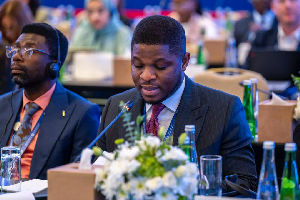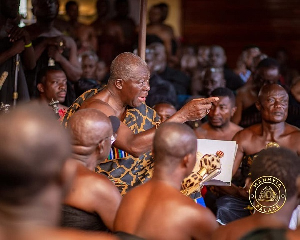I must begin by stating that I am not interested in the many analysis that others wish to subject us to as to what we should be calling this phenomenon of contract killings whether it should be accepted as contract killings or seen as vengeance killings which leads to contract killings or murders or just homicides; all just because the first person to go to town with this terminology is an opposition leader and we don’t want to be seen to be agreeing with him or offending those who never agree with him.
The fact of the matter still remains that over the past three weeks, three people have been gunned down and over the past two years there have been more than a dozen of these bizarre occurrences. Precious Ghanaian lives are being ended by unscrupulous people who do not rob or rape but only flee the scene having accomplished their mission.
Unfortunately for us, since these days even the football team you support shows which part of the political divide you may belong, some “experts” are at pain to engage in frivolous name selection or appropriate nomenclature rather than dealing with how to arrest this frightening phenomenon. It is this objective of arresting the phenomenon of contract killings that I seek in this article.
It is important to observe that in Australia where the most scientific research on contract killings in the world was undertaken and published in 2003 by the Australian Institute of Criminology (AIC), such a research was done not because too many Australians had been victims of contract killers, indeed from 1st July 1989 to 30th June 2002 the data gathered by the AIC suggested only 2% of all Australian homicides were contract killings. Clearly the principle that every single life is of extreme importance mandated such an extensive research and this same principle must inform the Ghanaian government and her security operatives.
I will admonish all, especially our security agencies to look out for this AIC research because though Australia is the case study, it generally focused on universally relevant questions such as:
1) Factors that differentiate successful and unsuccessful contract killings;
2) The characteristics of attempted and completed contract killings; including who are the victims, and who are the principal instigators;
3) Typologies of contract killings, including why are contract killers sought
and
4) The nature and level of police intervention in preventing the completion of contract killings.
It is important for our government and security agencies to acknowledge this new threat and assure Ghanaians that they are able to rise to the occasion.
It has been reported that most of the victims of these contract killings were threatened and that they reported such threats to the security agencies. It is important for us to know what the security agencies did when these complaints were lodged. It is more important for the security agencies to now take such complaints more seriously than before.
Is it possible for the security agencies to establish special units which will grant special advice to people who receive such threats as to how they should lead their lives, what to do and what not to do? Considering that at least two sitting MPs have received similar threats in recent times. People should not just continue to do the same things or live their lives as before when they receive such threats – a professional counseling and surveillance on these possible victims will go a long way to save lives rather than the police sitting back and waiting for the contract killers to strike only to report at the crime scene 45 minutes after to take the dead body to the morgue.
In researching on this phenomenon of contract killings, I was surprised to find out that there is a website where contract killers can be contracted to do whatever elimination a client requires and in whatever form he/she wishes the elimination to take, be it shooting, hanging, electrocuting, poisoning, etc. For obvious security reasons, I shall not disclose this web address here but clearly, contract killings have become an industry with its perpetrators engaged in brisk business and we will require an immediate, committed and sophisticated strategy at nibing this canker in the bud.
The security agencies must also take cognizance of the reward factor. Considering that this is an industry in which money plays a crucial role in wooing contract killers, by now there should be an undisclosed reward package for any person who refuses to accept to be a contract killer and exposes the person or people who tried to contract him/her. This will serve as a major step in making the much needed first arrest ever since these contract killings began.
When a first arrest is made and the appropriate punishment applied swiftly, it will act as deterrence and we can begin to breathe an air of freedom again.
It is important for us to note that those engaged in these contract killings threaten our freedom of expression, they threaten our confidence to live in our own country, they threaten our trust for each other as Ghanaians and they threaten our human resource which we need for development. It is because of these threats they pose that they must not be allowed to win.















